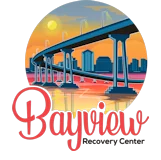Insurance Coverage for Addiction Treatment in California
Seeking help for drug or alcohol addiction is a courageous step, but for many Californians, the journey to recovery is often blocked by concerns about cost and insurance coverage. Understanding how insurance works for addiction treatment can make the process less overwhelming and help you or your loved one access the care needed for a healthier future.
Going through the challenges of life can be difficult enough. Imagine it being amplified for people who have addiction and mental illness. Paying for drug and alcohol addiction treatment is a common problem amongst people needing treatment. Financial burden and having access to necessary healthcare shouldn’t be added stress.
At Bayview Recovery Center in San Diego, California, our men’s rehab center provides insurance verification services, helpful payment plans, and financial resources, so people can focus on what matters most: recovery. Let’s explore the ins and outs of insurance for rehab in San Diego, California, including what’s covered and how to verify your benefits.
Why Do People Avoid Seeking Addiction Treatment?
Despite the growing awareness of addiction as a medical condition, many people still avoid seeking treatment. One of the most significant barriers is financial. The cost of rehab can be daunting, especially for those without insurance or with limited coverage. According to the Substance Abuse and Mental Health Services Administration (SAMHSA), millions of Americans who need substance use treatment do not receive it, and financial concerns are a leading reason.
Financial Barriers
Rehab programs can range from a few thousand dollars for outpatient care to tens of thousands for residential treatment. These costs include medical detox, therapy, medication, and aftercare planning. For many, the fear of incurring debt or being unable to pay for treatment leads to postponing or avoiding help altogether. However, insurance can significantly reduce these costs, making treatment more accessible.
How Insurance Works For Drug And Alcohol Treatment Programs
Health insurance is designed to help cover the costs of medical care, including addiction treatment. In California, most insurance plans, whether private, employer-sponsored, or government-funded, offer some level of coverage for substance use disorder (SUD) treatment. The extent of coverage depends on your specific plan, the type of treatment needed, and the facility you choose.
Insurance typically covers:
- Assessment and diagnosis
- Detoxification (detox) services
- Inpatient (residential) rehab
- Outpatient rehab
- Medication-assisted treatment (MAT)
- Therapy sessions
- Aftercare and relapse prevention
However, coverage details such as copays, deductibles, and out-of-pocket maximums vary. It’s essential to understand your policy and collaborate with treatment centers that can help you navigate the insurance process. To learn more about which insurance policies Bayview works with, please contact our admissions team. We’re here to help you navigate this often overwhelming and difficult process.
Does Insurance Cover Drug and Alcohol Rehab?
The good news is that most insurance plans in California are required by law to cover some aspect of addiction treatment. This includes both private insurance and public programs, such as Medi-Cal (California’s Medicaid program). The Mental Health Parity and Addiction Equity Act (MHPAEA) and the Affordable Care Act (ACA) have expanded access to behavioral health services, including substance use treatment.
The Affordable Care Act (ACA)
The ACA, passed in 2010, was a game-changer for coverage of addiction treatment. It classified substance use disorder services as one of the ten essential health benefits that must be included in all Marketplace insurance plans. This means that if you have an ACA-compliant plan, you are entitled to coverage for:
- Behavioral health treatment (including counseling and psychotherapy)
- Inpatient and outpatient services
- Prescription medications related to addiction treatment
The ACA also prohibits insurance companies from denying coverage due to pre-existing conditions, including addiction. This has made it easier for millions of Americans to access the care they need.
What Does Addiction Treatment Cover?
While addiction treatment must be covered by major insurance providers, at least partially, due to the Affordable Care Act (ACA), the specifics can vary. Here are the benefits that are commonly included in most plans:
Detoxification (Detox)
Drug and alcohol detox is often the first step in recovery, helping individuals safely withdraw from drugs or alcohol under medical supervision. Most insurance plans cover medically necessary detox, which may be provided in a hospital, a detox center, or as part of a rehab facility. Bayview Recovery Center doesn’t provide detox services, but we will refer to a facility that does.
Outpatient Rehab
Outpatient treatment programs allow individuals to live at home while attending therapy sessions several times a week. Outpatient levels of care, such as a partial hospitalization program (PHP) and intensive outpatient program (IOP), are often more affordable and are covered by most insurance plans.
Medication-Assisted Treatment (MAT)
MAT combines medications (like methadone, buprenorphine, or naltrexone) with therapy. Insurance plans typically cover MAT, especially for opioid or alcohol use disorders.
Therapy and Counseling
Addiction counseling services, such as individual therapy, group therapy, and family therapy, are essential components of addiction treatment. Insurance usually covers these services, though the number of sessions may be limited.
Aftercare and Relapse Prevention
Ongoing support is crucial for long-term recovery. Many insurance plans cover addiction aftercare programs, such as relapse prevention, follow-up counseling, support groups, and case management.

Dual Diagnosis Treatment
This level of care is ideal for those with severe addiction or co-occurring mental health disorders. Insurance may cover all or part of the cost, depending on your plan and the facility’s network status.
What Types of Rehab Facilities Are Covered?
Insurance coverage often depends on whether a facility is “in-network” or “out-of-network.” Here’s what you need to know:
In-Network Facilities
These are treatment centers that have agreements with your insurance provider to offer services at negotiated rates. Using an in-network facility usually means lower out-of-pocket costs.
Out-of-Network Facilities
These centers do not have contracts with your insurer. While some plans offer partial coverage for out-of-network care, you may pay more out of pocket.
Types of Facilities
- Hospital-based programs: Often covered for detox and acute care.
- Residential treatment centers: Covered if deemed medically necessary.
- Outpatient clinics: Widely covered, especially for ongoing therapy. Bayview Recovery offers a variety of outpatient programs.
- Specialty programs: Some insurance plans cover gender-specific, faith-based, or holistic programs, but coverage varies.
To better understand your out-of-pocket costs, always check with your insurance provider or the treatment center to confirm coverage before starting a program. This will eliminate any unnecessary stress during your treatment.
Types Of Insurance For Rehab
Californians have several options for insurance coverage:
Private Insurance
Plans are purchased individually or through an employer. Major providers in California include Blue Shield, Anthem Blue Cross, Kaiser Permanente, Aetna, Cigna, and UnitedHealthcare. Coverage varies by plan.
Medi-Cal (California Medicaid)
Medi-Cal covers a wide range of addiction treatment services, including detox, residential, and outpatient care. Eligibility is based on income and other factors.
Medicare
For those 65 and older or with certain disabilities, Medicare covers some addiction treatment services, including inpatient and outpatient care, if deemed medically necessary.
Military Insurance (TRICARE)
TRICARE and TriWest insurance provides coverage for active-duty military, veterans, and their families, including substance use disorder treatment.
Marketplace Plans
Plans purchased through Covered California, the state’s health insurance exchange, must include addiction treatment as an essential benefit.
Insurance coverage for drug and alcohol rehab in California has improved dramatically in recent years, thanks to laws like the ACA and MHPAEA. While navigating insurance can be complex, understanding your options and working with experienced professionals can help you access the treatment you deserve. Don’t let financial concerns stand in the way of your recovery—help is available, and a brighter future is within reach.
How to Verify Coverage and Find the Best Treatment
Before starting treatment, it’s crucial to verify your insurance coverage. Here’s how:
- Contact Your Insurance Provider: Call the number on your insurance card and ask about your behavioral health benefits. Inquire about covered services, in-network providers, copays, deductibles, and any pre-authorization requirements.
- Work With Treatment Centers: Many rehab centers have insurance specialists who can verify your benefits and help you understand your coverage.
- Check Network Status: Using an in-network facility usually means lower costs. Ask for a list of in-network rehab centers.
- Get Pre-Authorization: Some insurance plans require pre-authorization for certain services. Make sure all necessary paperwork is completed before starting treatment.
- Understand Your Costs: Ask about copays, coinsurance, deductibles, and out-of-pocket maximums so you know what to expect financially.
Finding Drug And Alcohol Rehab Centers That Accept My Plan
Finding a rehab center that accepts your insurance is easier than ever. Here are some steps to help you get started:
- Use Your Insurance Provider’s Directory: Most insurers have online directories of in-network providers.
- Contact Treatment Centers Directly: Many centers will verify your insurance and explain your benefits.
- Ask for Referrals: Your primary care doctor or mental health professional can recommend reputable facilities.
- Check Accreditation: Look for centers accredited by organizations like The Joint Commission or CARF, which ensures high standards of care.
When evaluating rehab centers, consider factors such as location, treatment approach, staff credentials, and aftercare support. The right fit can make a significant difference in your recovery journey.
If Insurance for Rehab Doesn’t Cover, There Are Other Options
If you don’t have insurance or your plan doesn’t cover the treatment you need, don’t lose hope. There are alternative ways to access care:
Sliding Scale Fees
Many rehab centers offer sliding scale fees based on your income, making treatment more affordable.
Payment Plans
Some facilities allow you to pay for treatment in installments over time.
State-Funded Programs
California offers publicly funded treatment programs for those who qualify. Contact your county’s behavioral health department for more information.
Grants and Scholarships
Some organizations and foundations provide grants or scholarships for addiction treatment.
Employee Assistance Programs (EAPs)
If you’re employed, your workplace may offer an EAP that includes free or low-cost counseling and referrals to treatment.
Nonprofit and Faith-Based Programs
Many nonprofits and faith-based organizations offer free or low-cost addiction treatment services.
Ready to Get Help? Bayview Recovery Center is Here
Taking the first step toward recovery can be overwhelming, especially when navigating insurance and financial concerns. At Bayview Recovery Center in San Diego, CA, we’re committed to making the process as smooth as possible. Our experienced team will work with you to verify your insurance, explain your benefits, and help you access the care you need.
We offer many options for treatment, including detox, outpatient programs, and aftercare planning. Our evidence-based approach is tailored to your unique needs, ensuring the best chance for lasting recovery.
If you’re ready to take the next step, contact us today. Our compassionate staff is here to answer your questions, verify your insurance, and guide you on your journey to a healthier, substance-free life.

Alyssa is a licensed Clinical Social Worker and received her Master’s degree from San Diego State University. She has experience working with individuals in recovery of all ages for over eight years. Alyssa has also worked with at-risk homeless foster youth transitioning into independent living along with the families in the neonatal intensive care unit at UCSD.
